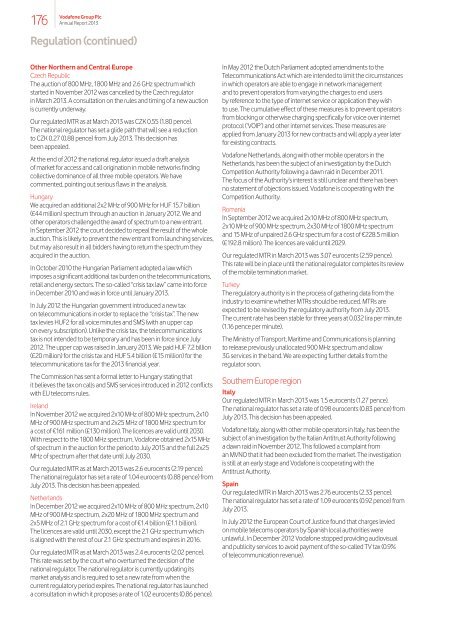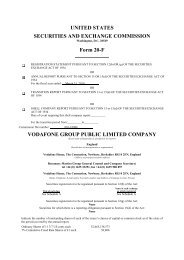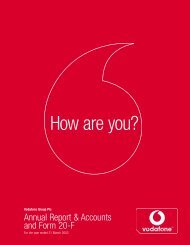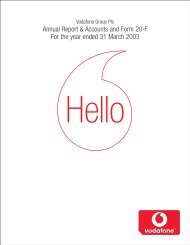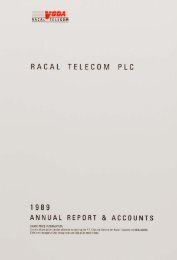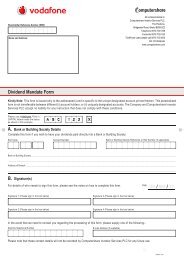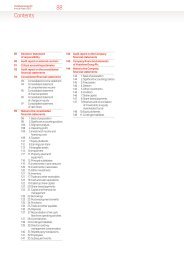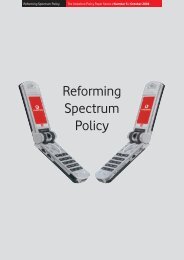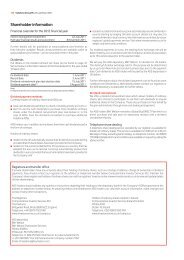The way ahead? - Vodafone
The way ahead? - Vodafone
The way ahead? - Vodafone
Create successful ePaper yourself
Turn your PDF publications into a flip-book with our unique Google optimized e-Paper software.
176<br />
<strong>Vodafone</strong> Group Plc<br />
Annual Report 2013<br />
Regulation (continued)<br />
Other Northern and Central Europe<br />
Czech Republic<br />
<strong>The</strong> auction of 800 MHz, 1800 MHz and 2.6 GHz spectrum which<br />
started in November 2012 was cancelled by the Czech regulator<br />
in March 2013. A consultation on the rules and timing of a new auction<br />
is currently under<strong>way</strong>.<br />
Our regulated MTR as at March 2013 was CZK 0.55 (1.80 pence).<br />
<strong>The</strong> national regulator has set a glide path that will see a reduction<br />
to CZK 0.27 (0.88 pence) from July 2013. This decision has<br />
been appealed.<br />
At the end of 2012 the national regulator issued a draft analysis<br />
of market for access and call origination in mobile networks finding<br />
collective dominance of all three mobile operators. We have<br />
commented, pointing out serious flaws in the analysis.<br />
Hungary<br />
We acquired an additional 2x2 MHz of 900 MHz for HUF 15.7 billion<br />
(£44 million) spectrum through an auction in January 2012. We and<br />
other operators challenged the award of spectrum to a new entrant.<br />
In September 2012 the court decided to repeal the result of the whole<br />
auction. This is likely to prevent the new entrant from launching services,<br />
but may also result in all bidders having to return the spectrum they<br />
acquired in the auction.<br />
In October 2010 the Hungarian Parliament adopted a law which<br />
imposes a significant additional tax burden on the telecommunications,<br />
retail and energy sectors. <strong>The</strong> so-called “crisis tax law” came into force<br />
in December 2010 and was in force until January 2013.<br />
In July 2012 the Hungarian government introduced a new tax<br />
on telecommunications in order to replace the “crisis tax”. <strong>The</strong> new<br />
tax levies HUF2 for all voice minutes and SMS (with an upper cap<br />
on every subscription). Unlike the crisis tax, the telecommunications<br />
tax is not intended to be temporary and has been in force since July<br />
2012. <strong>The</strong> upper cap was raised in January 2013. We paid HUF 7.2 billion<br />
(£20 million) for the crisis tax and HUF 5.4 billion (£15 million) for the<br />
telecommunications tax for the 2013 financial year.<br />
<strong>The</strong> Commission has sent a formal letter to Hungary stating that<br />
it believes the tax on calls and SMS services introduced in 2012 conflicts<br />
with EU telecoms rules.<br />
Ireland<br />
In November 2012 we acquired 2x10 MHz of 800 MHz spectrum, 2x10<br />
MHz of 900 MHz spectrum and 2x25 MHz of 1800 MHz spectrum for<br />
a cost of €161 million (£130 million). <strong>The</strong> licences are valid until 2030.<br />
With respect to the 1800 MHz spectrum, <strong>Vodafone</strong> obtained 2x15 MHz<br />
of spectrum in the auction for the period to July 2015 and the full 2x25<br />
MHz of spectrum after that date until July 2030.<br />
Our regulated MTR as at March 2013 was 2.6 eurocents (2.19 pence).<br />
<strong>The</strong> national regulator has set a rate of 1.04 eurocents (0.88 pence) from<br />
July 2013. This decision has been appealed.<br />
Netherlands<br />
In December 2012 we acquired 2x10 MHz of 800 MHz spectrum, 2x10<br />
MHz of 900 MHz spectrum, 2x20 MHz of 1800 MHz spectrum and<br />
2x5 MHz of 2.1 GHz spectrum for a cost of €1.4 billion (£1.1 billion).<br />
<strong>The</strong> licences are valid until 2030, except the 2.1 GHz spectrum which<br />
is aligned with the rest of our 2.1 GHz spectrum and expires in 2016.<br />
Our regulated MTR as at March 2013 was 2.4 eurocents (2.02 pence).<br />
This rate was set by the court who overturned the decision of the<br />
national regulator. <strong>The</strong> national regulator is currently updating its<br />
market analysis and is required to set a new rate from when the<br />
current regulatory period expires. <strong>The</strong> national regulator has launched<br />
a consultation in which it proposes a rate of 1.02 eurocents (0.86 pence).<br />
In May 2012 the Dutch Parliament adopted amendments to the<br />
Telecommunications Act which are intended to limit the circumstances<br />
in which operators are able to engage in network management<br />
and to prevent operators from varying the charges to end users<br />
by reference to the type of internet service or application they wish<br />
to use. <strong>The</strong> cumulative effect of these measures is to prevent operators<br />
from blocking or otherwise charging specifically for voice over internet<br />
protocol (‘VOIP’) and other internet services. <strong>The</strong>se measures are<br />
applied from January 2013 for new contracts and will apply a year later<br />
for existing contracts.<br />
<strong>Vodafone</strong> Netherlands, along with other mobile operators in the<br />
Netherlands, has been the subject of an investigation by the Dutch<br />
Competition Authority following a dawn raid in December 2011.<br />
<strong>The</strong> focus of the Authority’s interest is still unclear and there has been<br />
no statement of objections issued. <strong>Vodafone</strong> is cooperating with the<br />
Competition Authority.<br />
Romania<br />
In September 2012 we acquired 2x10 MHz of 800 MHz spectrum,<br />
2x10 MHz of 900 MHz spectrum, 2x30 MHz of 1800 MHz spectrum<br />
and 15 MHz of unpaired 2.6 GHz spectrum for a cost of €228.5 million<br />
(£192.8 million). <strong>The</strong> licences are valid until 2029.<br />
Our regulated MTR in March 2013 was 3.07 eurocents (2.59 pence).<br />
This rate will be in place until the national regulator completes its review<br />
of the mobile termination market.<br />
Turkey<br />
<strong>The</strong> regulatory authority is in the process of gathering data from the<br />
industry to examine whether MTRs should be reduced. MTRs are<br />
expected to be revised by the regulatory authority from July 2013.<br />
<strong>The</strong> current rate has been stable for three years at 0.032 lira per minute<br />
(1.16 pence per minute).<br />
<strong>The</strong> Ministry of Transport, Maritime and Communications is planning<br />
to release previously unallocated 900 MHz spectrum and allow<br />
3G services in the band. We are expecting further details from the<br />
regulator soon.<br />
Southern Europe region<br />
Italy<br />
Our regulated MTR in March 2013 was 1.5 eurocents (1.27 pence).<br />
<strong>The</strong> national regulator has set a rate of 0.98 eurocents (0.83 pence) from<br />
July 2013. This decision has been appealed.<br />
<strong>Vodafone</strong> Italy, along with other mobile operators in Italy, has been the<br />
subject of an investigation by the Italian Antitrust Authority following<br />
a dawn raid in November 2012. This followed a complaint from<br />
an MVNO that it had been excluded from the market. <strong>The</strong> investigation<br />
is still at an early stage and <strong>Vodafone</strong> is cooperating with the<br />
Antitrust Authority.<br />
Spain<br />
Our regulated MTR in March 2013 was 2.76 eurocents (2.33 pence).<br />
<strong>The</strong> national regulator has set a rate of 1.09 eurocents (0.92 pence) from<br />
July 2013.<br />
In July 2012 the European Court of Justice found that charges levied<br />
on mobile telecoms operators by Spanish local authorities were<br />
unlawful. In December 2012 <strong>Vodafone</strong> stopped providing audiovisual<br />
and publicity services to avoid payment of the so-called TV tax (0.9%<br />
of telecommunication revenue).


